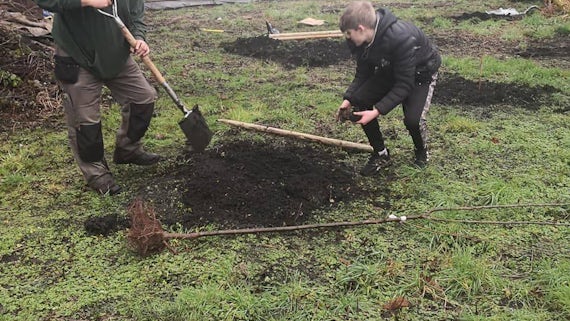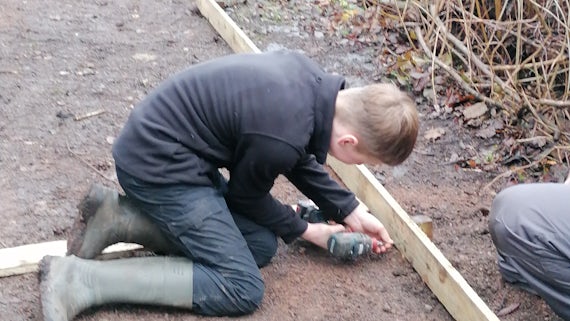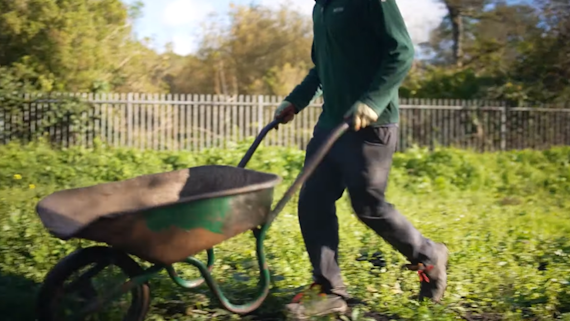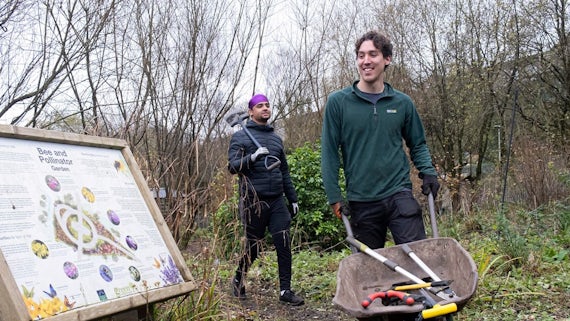
Green social prescribing in the Cynon Valley
Improving people’s health and wellbeing through connection to nature.
Many of us have experienced the way that connecting with nature improves the way we’re feeling and has a positive impact on our wellbeing.
Throughout the pandemic this idea became particularly important for many people. Taking a walk in nature, visiting parks or spending time in gardens provided an essential boost during what was a difficult period for many.
To explore the links between nature and wellbeing, a team from the university are working alongside a community social enterprise and health professionals. The project aims to make connection with nature accessible to wider number of people, and to help better understand the benefits that connecting with nature can provide.
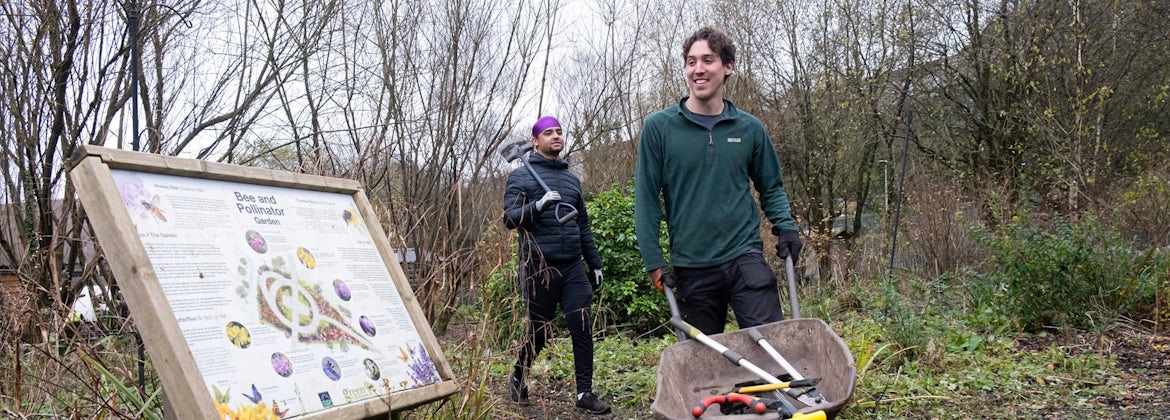
'Green prescribing' draws on the benefits of spending time in nature to improve people's wellbeing.
Prescribing time in nature
The project is based around the concept of ‘green prescribing’ which draws on the benefits of spending time in nature to improve people’s wellbeing. It is often seen as a type of 'social prescribing', where patients can be 'prescribed' an activity which encourages them to join with others in order to benefit their mental, and often their physical, health.
“Green prescribing is when a doctor writes a prescription but it is not for medicine,” explains GP and academic medical educator Dr Kamila Hawthorne. “It’s to get a patient to do something that will empower them and improve their wellbeing.”
It gives patients and community members the opportunity to take part in local nature based activities to improve their health and wellbeing. Activities could include walking for health schemes, park runs, community gardening, food growing programmes, conservation volunteering or art and cultural activities.
To help provide opportunities for green social prescribing and gather crucial data on its benefits, the project team are working alongside Cynon Valley Organic Adventures, a social enterprise based in Rhondda Cynon Taf. “On the site we offer alternative education services,” says Cynon Valley Organic Adventures’ founder and director Janis Werrett. “And doctors, health professionals and charities refer people to us for their wellbeing.”
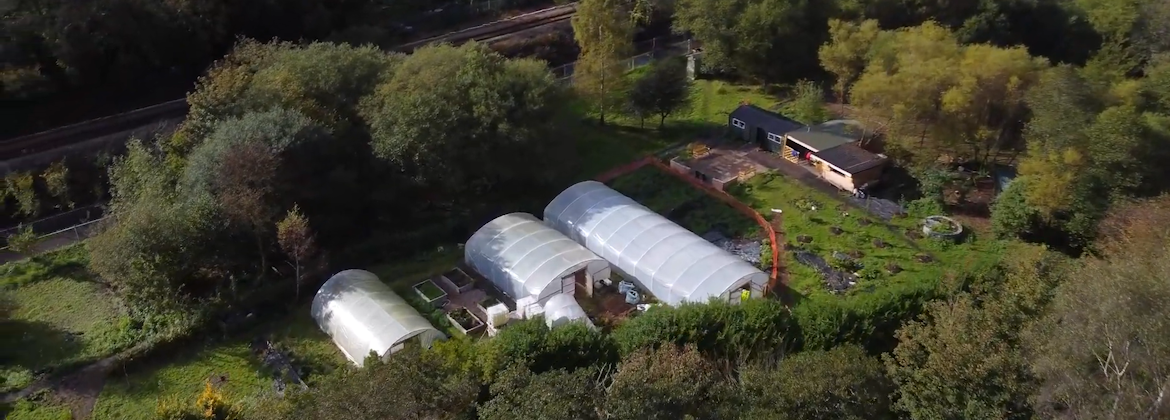
Cynon Valley Organic Adventures is a social enterprise based on a 5-acre piece of land in Rhondda Cynon Taf that includes a river, wet woodlands, orchards, pond and polytunnels.
Working with Cynon Valley Organic Adventures
The partnership between Cynon Valley Organic Adventures and the university has helped to develop an interactive nature trail in Abercynon, which was partly created by people referred to the scheme through green social prescribing. With support from the National Museum of Wales at Caerleon, work has also started on creating a Roman wellbeing garden and plans are in place to construct a Celtic roundhouse.
“There will be a medieval remedy garden, an ice age woodland, and a Celtic meadow with a Celtic roundhouse,” explains Janis Werrett.
Importantly, the partnership is also helping to gather evidence on the impacts of nature on people’s wellbeing.
“I think we all realise after Covid that connecting with nature makes us feel better, and it’s almost like a gut feeling that nature has a good impact on our wellbeing,” explains project lead Professor Les Baillie. “But surprisingly there’s very little scientific data to prove that really is the case.”
“Working with the community is an opportunity for us to generate that data which will allow us to go off and support more projects like this across the country.”
Through recording patients' experiences of the nature trail, the project will help generate real-world data on the benefits and capture how connecting with nature can promote health and wellbeing.
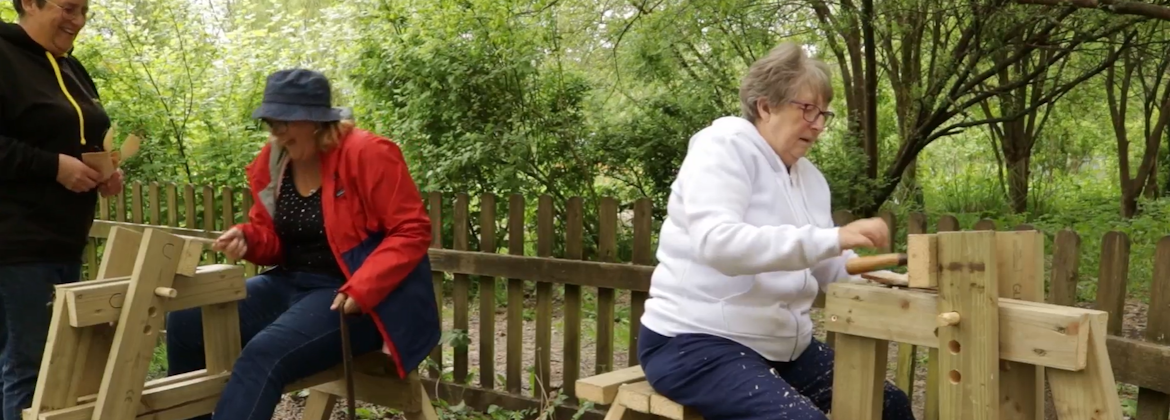
People referred to the project have the opportunity to take part in a wide range of nature based activities, including conservation and creative workshops.
Helping to make change
The project was sponsored by the Accelerate | Cyflymu programme and managed by the Clinical Innovation Accelerator (CIA) within Cardiff University’s School of Medicine. The CIA team supported and contributed to the project through its experienced team of professionals with expertise in accelerating the delivery of health and social care focused innovations through high quality collaborative research and stakeholder engagement.
“The project here in Abercynon was set up by Janis and colleagues, and it’s a great example of what individuals can do to make the change in their environment,” says Professor Les Baillie. “Projects like Accelerate play a key role in connecting the great idea with the people who have the ability to help realize the vision.”
Janis Werrett explains the impact that the project has had: “Before the Cardiff University project we were just a group of individuals on the plot of land, whereas now people are starting to see there are positive outcomes and that it is substance to what we do. It’s taken our organization to a completely different level.
“They’ve been really friendly, really supportive and the publicity and the recognition that we get from this project will also bring in lots of new partners.
“Green prescribing isn’t a well-known concept, but I’m looking forward to working with Cardiff University to help raise awareness of the benefits of nature on wellbeing. I’ve seen it change lives and I would like to see more people benefit from that.”
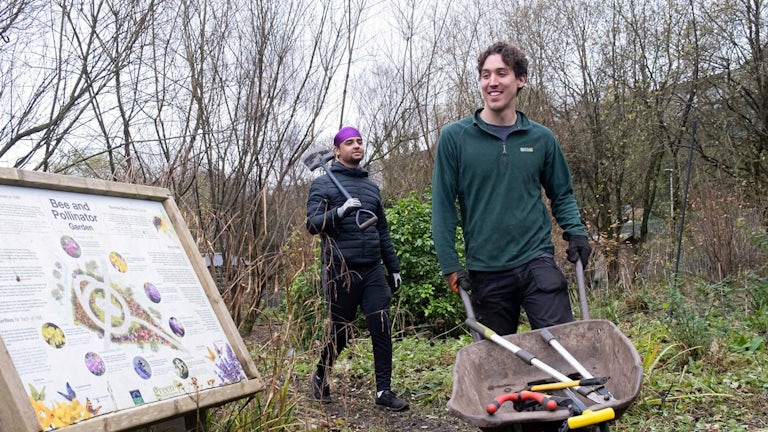
Our local community projects
We use our wide range of expertise to support and deliver impactful community led projects alongside student and staff volunteers.





